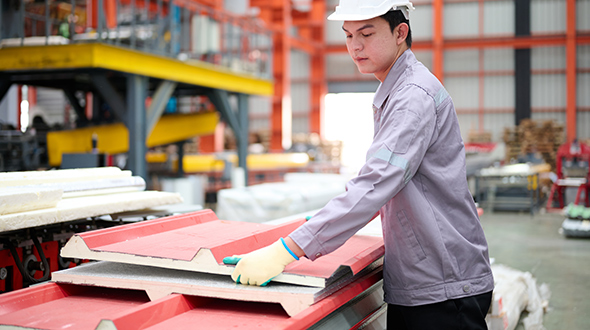A commercial roof warranty is your safeguard against unexpected roofing issues and protection for your investment. It typically covers material defects and installation errors, ensuring your roof lasts as expected. This article will explore what these warranties cover, their benefits and types, and how to select the right one for your building.
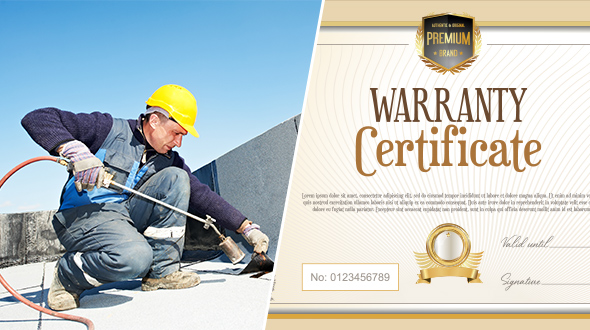
Key Takeaways
- Commercial roof warranties protect building owners against defects and installation errors, saving them from significant repair costs.
- Different types of warranties, such as manufacturer’s, contractor’s, and No Dollar Limit (NDL) warranties, offer varying levels of coverage for materials and workmanship.
- Not voiding a commercial roof warranty requires regular maintenance inspections, proper documentation, and adherence to manufacturer specifications to avoid voiding coverage.
Understanding Commercial Roof Warranties
Understanding commercial roof warranties is about knowing what they cover and appreciating their importance. These warranties are designed to protect building owners against defects and installation errors, ensuring that the roofing system performs as expected.
They can be the difference between a minor hiccup and a major financial burden.
Definition and Purpose
A commercial roof warranty is essentially a pledge guaranteeing the performance and quality of the roof. This warranty serves as a commitment from the contractor or manufacturer to ensure the roof’s longevity and reliability over time. Knowing the specifics of these warranties allows property owners to safeguard their roofing investments effectively.
A commercial roof warranty is designed to protect building owners from defects and installation errors. These warranties provide a safety net, ensuring that any issues related to materials or workmanship are addressed without additional out-of-pocket expenses.
Key Benefits
A commercial roof warranty offers several key benefits, including covering complete repair costs for leak-related issues caused by material failure or workmanship faults. It typically covers deterioration from normal weathering over a defined time period, manufacturing defects, and workmanship application, providing peace of mind to building owners.
A roofing contractor’s warranty is valuable as it covers both defective workmanship and defective products. This comprehensive coverage ensures that building owners are financially protected, allowing them to focus on their core business without worrying about future potential roofing problems.
Types of Commercial Roof Warranties

Commercial roof warranties come in various forms, each designed to address specific needs and concerns. The main types include:
- Manufacturer’s warranties
- Contractor’s warranties
- Labor and Materials warranties
- No Dollar Limit (NDL) warranties
Grasping these different types allows you to choose the most suitable warranty for your building.
Manufacturer’s Warranty
A manufacturer warranty typically covers defects in materials and lasts between 5 to 30 years, with an average duration of around 20 years. This type of warranty ensures that any material defects are addressed within the specified warranty period, providing significant protection against manufacturer’s warranties.
However, a material warranty only covers defects in the materials themselves and excludes labor or installation errors. This limitation means that while the materials may be replaced, the cost of labor to install these materials might not be covered under this type of warranty.
Contractor’s Warranty
A Contractor’s warranty, on the other hand, focuses on workmanship and installation. Typically, these warranties last between 1 and 5 years. The average duration is around two years. This type of warranty covers issues like leaks, improper flashing, and incorrect slope, all related to the installation process.
Contractors are responsible for labor or installation-related repairs during the warranty period, addressing any installation problems promptly without additional costs to the building owner.
Labor and Materials Warranty
Labor and Materials warranties provide comprehensive coverage for both the performance of materials and the quality of workmanship. These warranties, also known as system warranties, typically encompass both manufacturing defects and installation mistakes, ensuring complete protection for the building owner.
No Dollar Limit (NDL) Warranty
No Dollar Limit (NDL) warranties offer extensive benefits by providing full coverage for labor and material costs without depreciation over time. This type of warranty ensures that all expenses related to repair or replacement are covered, offering comprehensive protection for the building owner during the warranty period.
Although NDL warranties come with a higher initial cost compared to material-only options, the robust safety net they provide can justify the investment, particularly for those seeking maximum protection and peace of mind.
What Is Covered by a Commercial Roof Warranty?
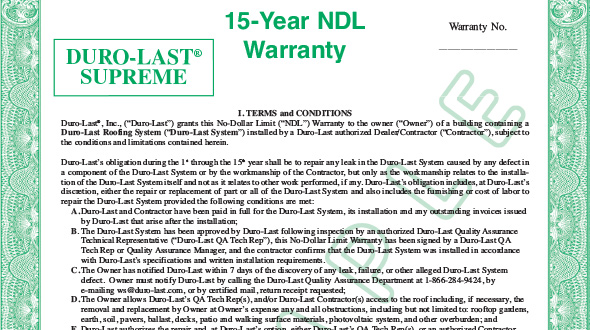
Knowing what is covered by a commercial roof warranty helps manage expectations and avoid surprises. These warranties typically cover the cost of repairs related to leak issues and protect against errors and defects caused by the manufacturer or installer.
Material Defects (Manufacturer)
Material defects coverage in a commercial roof warranty usually includes failures caused by manufacturing flaws in the roofing materials. This means that deficiencies in roofing materials, such as leaks directly caused by these defects, are typically included under material defect coverage.
This ensures that any issues related to the roofing materials’ quality are addressed promptly, preventing further damage and maintaining the roof’s integrity.
Workmanship Errors (Contractor)
Workmanship warranties cover problems arising from mistakes made during the installation process. These warranties include protection against issues caused by inadequate installation practices, such as leaks or structural failures.
The original installing contractor’s workmanship warranty typically covers problems during the first two years, ensuring that any errors in the installation are corrected without additional costs to the building owner.
System Failures (Manufacturer & Contractor)
System warranties cover a range of potential failures, including manufacturing defects and installation errors. This comprehensive coverage ensures that both materials and workmanship issues are addressed, providing robust protection for the building owner.
By encompassing both material defects and improper installation, system warranties offer a thorough safety net, ensuring that any problems with the roofing system are resolved efficiently and effectively.
Common Exclusions and Limitations
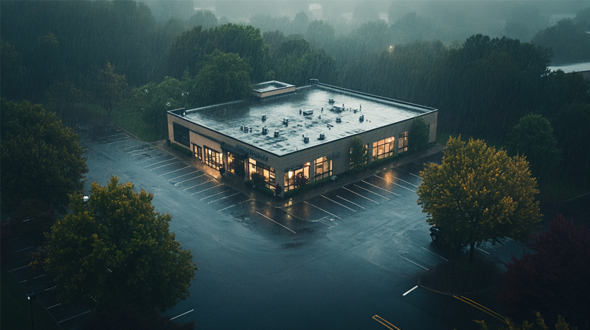
While commercial roof warranties provide significant protection, they also come with exclusions and limitations that building owners must be aware of. Common exclusions include damage from severe weather events, lack of maintenance, and unauthorized modifications, including those that may affect the roofing warranty.
Understanding these limitations is crucial to avoid unexpected repair costs.
Weather Damage
Most warranties explicitly exclude coverage for damage resulting from severe weather conditions. This means that damage from severe wind, hail, or other extreme weather events is typically not covered.
Building owners should thoroughly review warranty terms to recognize these limitations and plan accordingly to avoid unexpected repair costs after severe weather events.
Maintenance Neglect
Regular maintenance, including routine inspections, is key to ensuring your commercial roof warranty remains valid. Failure to perform these routine inspections can lead to denial of warranty claims for any damage that occurs.
Regular maintenance ensures that warranty coverage remains intact and avoids potential neglect-related issues.
Unauthorized Modifications
Making unauthorized modifications to the roof can invalidate the warranty completely. This includes any changes or repairs made without prior authorization from the manufacturer or contractor.
Building owners should seek approval before making any modifications to avoid voiding the warranty.
How to Choose the Right Commercial Roof Warranty

Selecting the right commercial roof warranty involves evaluating your specific needs and understanding the available options. Commercial roof warranties differ in duration, conditions, and coverage details, making it essential to choose one that aligns with your building’s requirements.
Evaluating Warranty Terms
It is crucial to read and understand the coverage of a commercial roof warranty after purchasing it. Pay attention to specific terms, conditions, and limitations before relying on the warranty. Understanding the terms of your warranty helps determine your responsibilities for repairs and ensures that you are aware of any requirements to maintain the warranty validity.
Assessing Coverage Needs
It is vital to choose the right roofing system for your needs. Post-installation maintenance, such as removing debris, securing flashing, patching punctures, and applying sealant, should be part of the coverage assessment for commercial roofing.
Understanding your coverage needs allows you to choose a warranty that provides adequate protection for your situation.
Considering Warranty Costs
The cost of a No Dollar Limit warranty is primarily determined by the roof’s square footage and the warranty length. Balancing initial expenses with potential long-term benefits is essential when evaluating a commercial roof warranty.
A comprehensive warranty can lead to significant savings in repairs and replacements over time, justifying higher upfront costs.
Maintaining Your Commercial Roof Warranty
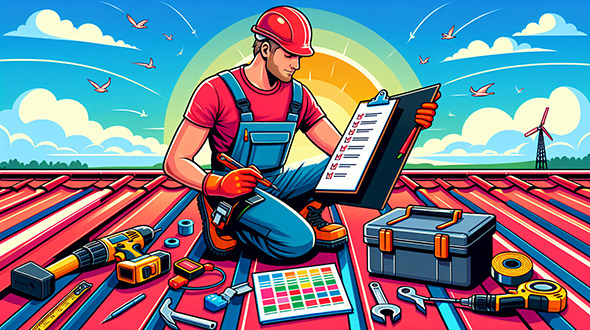
Maintaining your commercial roof warranty ensures its validity. Regular upkeep prevents the voiding of the warranty due to non-compliance with maintenance conditions.
Proper documentation and prompt action after damage are key for successful reimbursement claims.
Regular Inspections
Professional inspections, often required biannually, ensure compliance with warranty terms. Keeping inspections and maintenance work records is crucial for maintaining a commercial roof warranty.
Documenting Maintenance
Thorough documentation of all roof maintenance activities is essential for warranty claims and compliance verification. Prompt action after documenting damage aids in quicker assessment and potential repairs under warranty.
Following the Manufacturer’s Specifications
Adhering to the roofing manufacturer’s specifications preserves the validity of your warranty. Failure to follow these guidelines can void the warranty, leaving the owner liable for repairs.
The Warranty Claim Process
Navigating the warranty claim process can save you time and money. Contact your homeowner’s insurance representative promptly upon discovering roof damage.
This section outlines the steps to ensure your claim is processed smoothly and efficiently.
Contacting the Claims Department
Act quickly upon noticing any damage to your commercial roof. First, contact the claims department. Have all necessary documentation and evidence ready when you make your initial contact.
Promptly reaching out ensures your claim is logged and allows you to begin the repair process without delay.
Inspection and Repair
After filing a claim, the claims department will send a roofing contractor to inspect the roof and assess the damage. Using a certified or approved commercial roofing contractor is crucial as they are familiar with specific warranty requirements and installation techniques.
This ensures repairs align with warranty requirements and maintains the warranty’s validity.
Documentation and Reimbursement
Accurate documentation of all services, repairs, maintenance, and inspections is vital for successful reimbursement claims. Proper documentation verifies compliance with warranty conditions and supports your claim during the warranty process.
Transferring a Commercial Roof Warranty
Transferring a commercial roof warranty enhances property value and provides peace of mind for new owners.
Transferability terms dictate whether a warranty can be passed to a new owner and may require the current owner to notify the manufacturer.
Transferability Terms
Not all warranties are transferable, with workmanship warranties frequently being non-transferable. Some warranties impose a time limit for transfer requests, often requiring submission within 60 days of the sale.
Understanding these terms ensures the warranty remains valid during ownership transitions.
Required Documentation
When transferring a warranty, carefully read the manufacturer’s warranty to ensure coverage. Required documentation typically includes written requests, proof of ownership, and potential transfer fees.
Knowing the necessary paperwork related to the roof warranty is crucial when purchasing a commercial building.
Emergency Repairs and Your Warranty
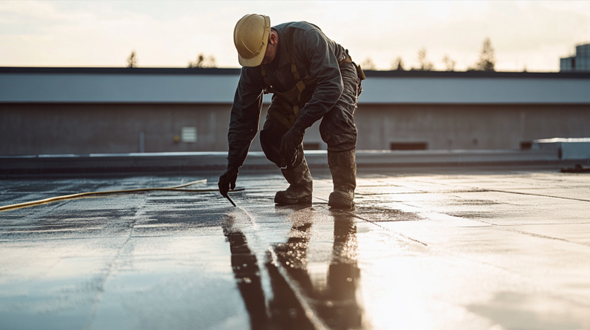
Act quickly during emergency repairs while ensuring you maintain your warranty coverage. Promptly assess the situation and mitigate further damage by securing the area.
Using certified contractors for emergency repairs ensures compliant repairs and maintains your warranty.
Immediate Actions
Contact the contractor who installed the roof immediately upon discovering the damage. Using a tarp to cover exposed areas temporarily helps mitigate damage until professional repairs are made.
Prompt repairs prevent further damage and potential health hazards.
Working with Approved Contractors
Certified contractors are crucial for warranty work as they are trained in proper product installation techniques. The professional roofing contractor who installed the roof can assist with emergency repairs under warranty, ensuring repairs align with warranty requirements.
Commercial Warranty Summary
Commercial roof warranties are an essential investment for protecting your building from unexpected repair costs. Understanding the different types of warranties, what they cover, and how to maintain them can save you time and money in the long run. Regular inspections, proper documentation, and following manufacturer specifications are key to ensuring your warranty remains valid.
Selecting the right warranty involves evaluating your specific needs, assessing coverage options, and considering the costs involved. Doing so lets you choose a warranty that provides the best protection for your commercial roof.
In conclusion, a well-chosen and properly maintained commercial roof warranty offers invaluable peace of mind, allowing building owners to focus on their core business operations without worrying about potential roofing problems.
Frequently Asked Questions
What is the primary purpose of a commercial roof warranty?
The primary purpose of a commercial roof warranty is to safeguard building owners from defects and installation errors, ensuring the roofing system operates effectively and minimizing unexpected repair expenses.
What are the different types of commercial roof warranties?
The different types of commercial roof warranties include manufacturer’s warranties, contractor’s warranties, Labor and Materials warranties, and No Dollar Limit (NDL) warranties. Understanding these options is crucial for protecting your investment.
What is typically covered by a commercial roof warranty?
A commercial roof warranty generally covers repairs for leaks, material defects, workmanship errors, and significant system failures. It’s essential to review specific warranty details, as coverage can vary.
What are common exclusions in commercial roof warranties?
Common exclusions in commercial roof warranties typically involve damage from severe weather, poor maintenance, and unauthorized alterations. It’s crucial to review your warranty details to understand these limitations fully.
How can I maintain my commercial roof warranty?
To maintain your commercial roof warranty, ensure you conduct regular inspections, keep thorough documentation of all maintenance activities, and strictly adhere to the manufacturer’s specifications. This diligence will help protect your investment and ensure compliance with warranty requirements.
(404) 220-9288
The post Commercial Roof Warranty Explained appeared first on atlantacommercialroofingcontractors.com
